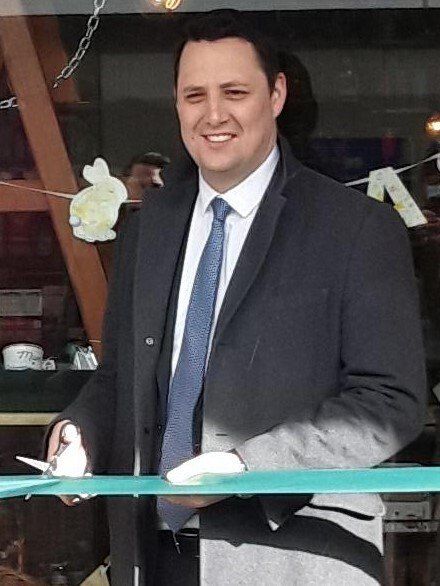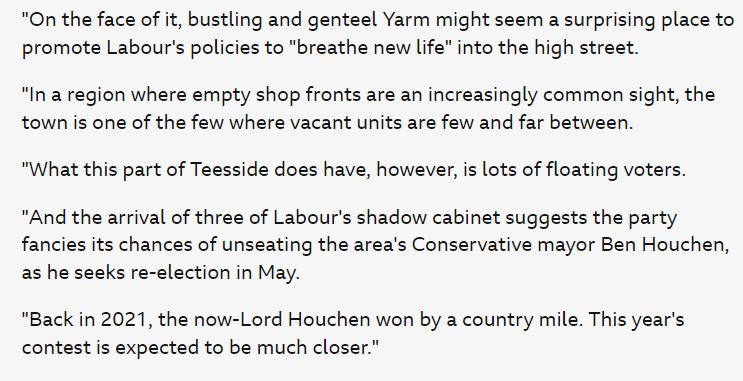99 Lead Balloons:
Labour’s Losing
Strategy for the
Tees Valley
Mayoralty

Tees Valley Mayor, Ben Houchen
Scott Hunter
15 April 2024
When Ben Houchen insisted recently that this was a strictly local election and had nothing to do with what Westminster Tories are getting up to, he revealed himself to be nervous about the outcome. After all, as the Party limps from one catastrophe to another, and with annihilation in the forthcoming council elections an absolute certainty, he could be forgiven for worrying that it might just drag him down with it, despite his apparent widespread popularity with voters.
But if he really is worried he can take some solace from the fact that the nicest thing you could say about Labour’s campaign is that it’s gloriously lacklustre. For those who have long suspected Houchen’s motives and the divergence between the rhetoric of jobs and prosperity and reality, this is some cause for concern. But if the campaign to unseat him is causing concern, the reasons behind it are even more worrying.
Start with the arrival in Yarm last week of Angela Rayner, Yvette Cooper and Rachel Reeves. They will no doubt be relieved that as the media reports started to roll in, they dwelled less on the chicken suits who harangued them in the street that they might have feared. But when they get a minute, they might like to have a look at the subtle commentary by BBC North East correspondent, Luke Walton:

Walton wonders out loud why they picked Yarm, of all places, to launch their High Streets campaign, given that it does not epitomise the current crisis in town centres. He suggests that it may be to do with the upcoming mayoral election, but he is too polite to mention that they omitted to say anything about it while they were there. Nor was there any sign of their mayoral candidate, Chris McEwan, in any of the press photos.
After a couple of days, however, one appeared in his social media:

There are two problems with this. On the day that Labour launches its policy for the regeneration of town centres, he makes a comment in support of it, and criticises the government for their inaction overt this. There was no corresponding comment from the visiting trio of the role of devolved authorities in pursuing their policy.
The second problem is his reference to the Tories. Because the Tories are not really his opponents in this election. The opponent is someone who, from the outset, has set himself apart from the Conservatives in government and much of his electoral success and public approval is down to that distancing. In 2017, with his campaign to buy back Teesside Airport, he became the successful unthatcherite Tory.
While, in contrast to other metro mayors around the country, there may be a lot of dubious activity, he nonetheless shares with them that spirit of independence, that makes devolution work. When he criticises Labour it is principally local Labour politicians that are his targets, not the party central. While the criticism he makes may not be fair, as a strategy it has consistently worked for him. And won him 73% of the vote the last time the electorate went to the polls.
What is also apparent is that Conservative Party seems to be very relaxed about the way he positions himself. And he continues to be allowed to write his own script.
We can’t help noticing that the same does not apply to Labour, where there is always a degree of tension between the Party Central and Sadiq Khan and Andy Burnham.
Currently there is no credible polling, at least not in the public domain, that shows the strength of support that Houchen continues to enjoy, or, conversely, the extent to which his reputation has been tarnished by recent events. One thing that should be abundantly clear, however, is that what is extremely popular is devolution. And for many in the Tees Valley this is inextricably linked with the person of Ben Houchen.
Labour’s task in this election period is to separate them. In order to do that, they need to talk about Houchen. When that finally happened, that was also less than edifying. In the past few days the following has appeared on various social media sites:

So, what’s the problem with that? Firstly, in the middle of an election campaign why is there any need for a petition? If McEwan wins, he will immediately get access to the books anyway. But once elected he can study the books till he’s blue in the face; they won’t yield anything unless there is an inquiry in which witnesses can be compelled to undergo cross examination.
So, secondly, it doesn’t say who he’s intending to send his petition to. He can’t send it to the government because they cover for Houchen and have already point blank refused to countenance any further inquiry into Teesworks. Does he intend to send it to the Labour Party which has refused to commit to a National Audit Office inquiry once installed in government? It seems unlikely that he is using his election platform to challenge his own party.
Does he therefore intend to send his petition to Houchen? Who else is there?
How have we got to this point where the incumbent is believed to be a charlatan, yet his opponent studiously avoids challenging him on his record in office? And how has Chris McEwan got this far into the campaign without apparently noticing that it is the Tees Valley Authority in its entirety that is dysfunctional, not just Teesworks? And beyond that, there is the make believe about jobs, investment and prosperity that Houchen’s propaganda machine constantly disgorges. Until Chris McEwan tackles those things, the greatest hurdle that Houchen has to negotiate is not him but the zombie government with which he is associated.
If Houchen succeeds in winning a third term in office, it will be a difficult one for him, and things will undoubtedly continue to unravel. But while that is happening it is the people of the Tees Valley who are left in the lurch.
Houchen is clearly worried about losing, and a bold campaign to challenge his record and expose his failings could probably achieve that. But not necessarily. Labour could do all the right things and still lose (after all, this will probably be a low turnout election, where the result is unpredictable).
If Labour loses without adequately challenging Houchen, on the other hand, we are entitled to question just how committed it is to the regeneration of this region, and to the progress of its devolution. What is becoming increasingly difficult to deny is that Labour is indifferent to devolution, that it wants a Tees Valley mayor who is content to do the bidding of the party central and be their mouthpiece. That is not devolution in any meaningful sense. The accusation to be made against Labour is that it remains wedded to top-down government.
And to anyone who would point to their establishment of the Scottish Parliament, we would counter with the observation that they did this under sufferance, that they acted because there was the threat of significant social unrest if they failed, not out any real desire to pursue a policy of dismantling the kind of excessive central control that saw Scotland burdened for nearly two decades with a governing party that it did not vote for.
Labour’s opponents in this region constantly pose the ‘what did Labour ever do for us?’ question. As long as Labour fails to embrace devolution, we have to admit that while these may be right wing zealots, they have a point.
